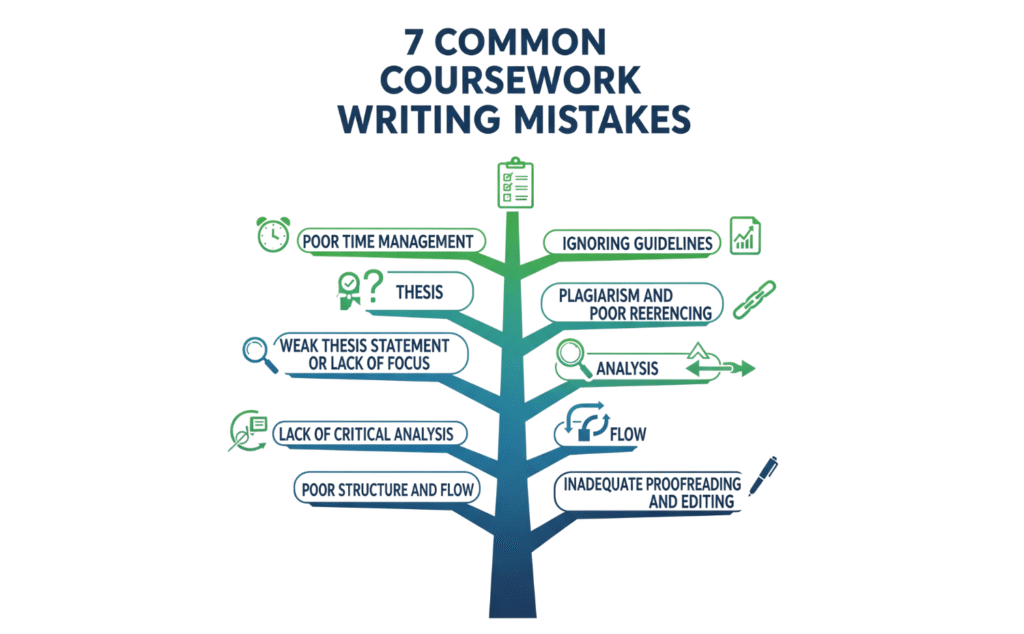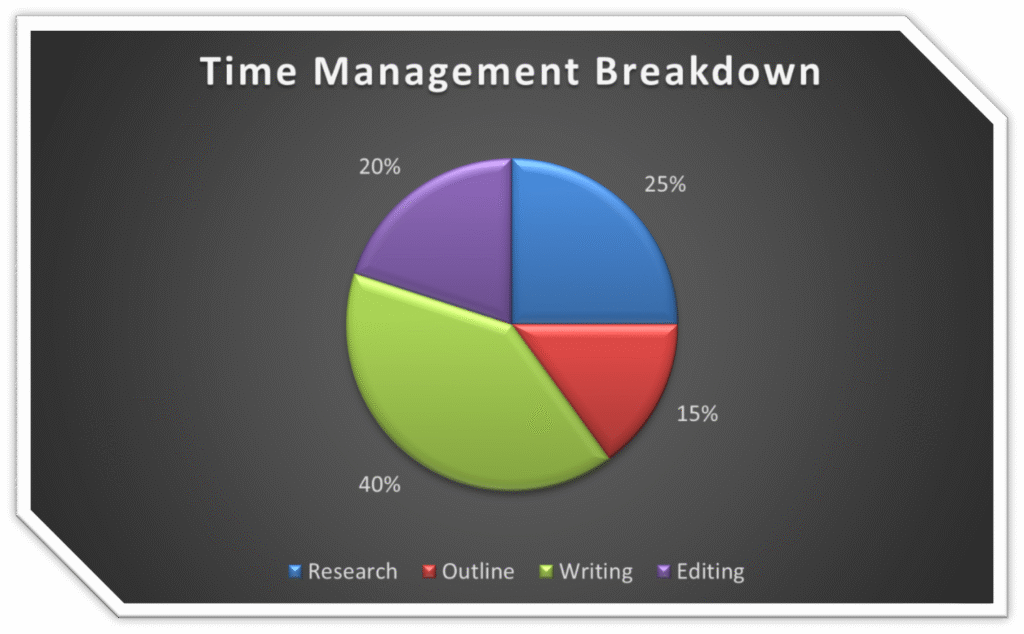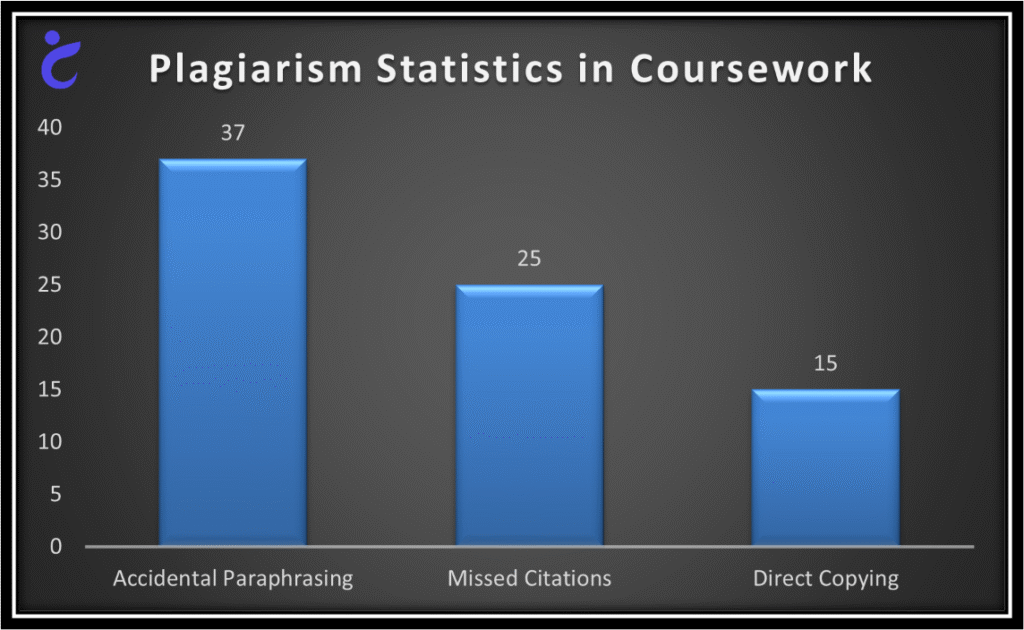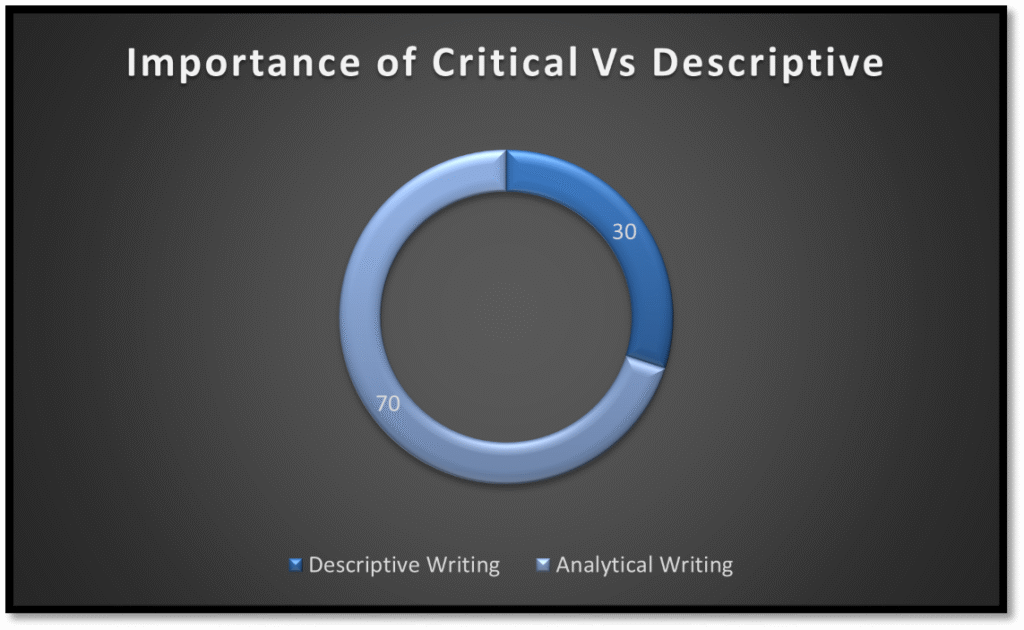Coursework is a major part of every student’s academic journey, and understanding the mistakes in coursework writing can make a big difference in your grades—whether you’re in college, university, or even high school. It includes a range of assignments like essays, research papers, projects, and reports that contribute significantly to your final grades. That’s why mastering coursework writing is so important for academic success. But here’s the problem—many students unknowingly make common coursework errors that lower their marks. It’s rarely about not understanding the subject; more often, it’s things like poor time management, weak structure, ignoring guidelines, or not proofreading coursework properly. Why students lose marks in coursework often comes down to these avoidable mistakes.

These simple coursework writing mistakes can make a big difference in your results. If you’re struggling with any of these, consider seeking academic writing helpto improve your skills and outcomes.
The good news? These mistakes are easy to fix once you know what to look out for. In this blog post, we’ll cover the 7 most common mistakes in coursework writing—and how to avoid mistakes in coursework writing. Whether you’re working on your own or using a trusted coursework writing service, these tips can help you improve your writing and boost your grades. Keep reading to level up your coursework game!
Mistake #1: Poor Time Management
Let’s be honest—most of us have been guilty of leaving coursework until the last minute. You tell yourself you’ll start tomorrow, and suddenly the deadline is just two days away and you’re in panic mode. Rushing through an assignment usually leads to low-quality work, more stress, and careless coursework writing mistakes that could’ve been avoided with better planning.

Another big issue is skipping the preparation stage. A lot of students dive into writing without any clear outline. This makes your structure of coursework feel disorganized and hard to follow. Proper planning may seem like an extra step, but it actually saves you time and boosts your writing quality.
Here’s how to manage your coursework effectively:
- Use a calendar or planner to track all your assignment deadlines.
- Break your coursework into smaller parts (research, outline, writing, editing).
- Set mini-deadlines to stay on schedule and reduce pressure.
If you really want to improve your coursework writing, remember it’s not a sprint—it’s a steady process. Start early, stay consistent, and don’t hesitate to get coursework help UK or even academic writing help when needed.
Mistake #2: Ignoring the Guidelines and Assessment Criteria
One of the easiest ways to lose marks in coursework is by not following the assignment guidelines properly. Sounds simple, right? But you’d be surprised how many students skip reading the full brief or just skim through it once before jumping in. Big mistake!
Your UK university assignmentsbrief and assessment criteria are like a roadmap. They tell you exactly what your instructor expects—what topic to cover, the required word count, the correct structure of coursework, and the referencing style to use (APA, Harvard, MLA, etc.).
Even if your content is strong, ignoring small things like formatting rules or word limits can lower your grade. That’s why one of the best tips to improve coursework writing is to read the brief thoroughly—every time.
Quick tip: highlight key instructions, create a checklist, and keep it handy as you write. This simple habit can help you stay on track and improve your coursework grades without much extra effort.
Mistake #3: Weak Thesis Statement or Lack of Focus
Starting your coursework without a clear direction is like going on a road trip without a map—you’ll end up lost and frustrated. One of the most common coursework writing mistakes is choosing a topic that’s too vague or broad. Without focus, your ideas can get messy and your writing ends up all over the place.
Your thesis statement is the heart of your assignment. It’s the main argument or point you’re trying to make. If your thesis is weak, unclear, or missing altogether, the entire coursework structure will suffer. Readers (and markers) won’t know what your work is really about.
Here’s how to stay focused and improve your coursework writing:
- Choose specific and focused coursework topics.
- Learn how to write a strong thesis statement in just one or two clear sentences.
- Make sure every paragraph connects back to your main point.
A solid thesis keeps your writing on track, makes it easier to structure your ideas, and helps your coursework stand out.
Mistake #4: Plagiarism and Poor Referencing
Plagiarism in coursework might sound like a scary word, but it’s something that happens more often than you’d think—sometimes without even realizing it. Whether it’s copying a few lines from a website without proper citation, or forgetting to put quotation marks around a direct quote, it still counts. And yes, most universities take it very seriously.

According to Coursework Writing Service, nearly 37% of students they assist had at least one assignment flagged due to accidental plagiarism—most of it from improper paraphrasing or missed citations.
Another common issue—often one of the most overlooked coursework writing mistakes—is using the wrong referencing style. Maybe your tutor asked for Harvard, but you used APA. Or maybe you’re mixing styles without noticing. Knowing the difference between APA vs Harvard referencing (or MLA, Chicago, etc.) is important for your academic credibility.
Here’s how to avoid plagiarism in coursework:
- Use academic citation tools like Zotero, CiteThisForMe, or Google Docs’ citation feature to format your sources properly.
- Learn to paraphrase and quote without copying.
- Always credit your sources, even when you’re summarizing ideas.
For a clear guide on plagiarism and referencing, check out MIT’s academic integrity resources or Harvard’s citation help—or ask for advice through university-level coursework help UK students find useful.
Using the correct referencing style not only keeps you out of trouble but also shows that you’ve done proper research. It’s a small step that can make a big difference in your coursework marks.
Mistake #5: Lack of Critical Analysis
One key thing that separates average coursework from top-grade work is critical analysis. Many students fall into the trap of just describing things—what happened, what a theory says, or what a source mentions. But strong UK university assignments aren’t just about repeating facts. They’re about showing deeper understanding.

Failing to analyse deeply is one of the most frequent coursework writing mistakes, especially among students new to academic writing.
Descriptive writing tells the reader what is happening. In contrast, analytical writing explains why it matters, how it works, and what the consequences or implications are. If your coursework only summarizes what others have said, you’re missing the chance to include your own insight—and that’s where marks are often lost.
Here’s how to improve critical analysis in coursework:
- Don’t just accept a source—question and challenge it.
- Compare multiple viewpoints, evaluate strengths and weaknesses, and share your own perspective.
- Use solid evidence to support your points and explain why it matters.
These best tips to improve coursework writingaren’t about writing more—they’re about thinking more. If you want to know how to write analytical assignments, start by going beyond the surface—or consult professional academic writing helpfor expert guidance.
Mistake #6: Poor Structure and Flow
Even if your ideas are great, poor structure can make your coursework confusing and hard to read. If your paragraphs seem all over the place or your ideas jump around with no clear direction, the reader can get lost—and that often leads to lower grades. Why students lose marks in coursework frequently comes back to disorganized content and lack of flow.
Disorganized writing usually happens when there’s no clear plan or when you forget to add smooth transitions between sections. That’s why learning how to structure courseworkproperly is so important. That’s why learning how to structure coursework properly is so important—and it’s also one of the most overlooked coursework writing mistakes.
A strong assignment needs a clear beginning (the introduction), a well-structured middle part (the body), and a proper ending (the conclusion). Every paragraph should link nicely to the next so that your ideas flow naturally—this is a big part of good academic writing.
Here’s how to fix it:
- Create a basic outline before you begin—know what goes where.
- Start each paragraph with a clear topic sentence.
- Use linking words like “furthermore,” “however,” or “as a result” to keep your ideas connected.
When your paragraph is well-structured, your coursework makes writing more readable with stronger impression. These small changes can greatly improve your coursework writing and help you get better marks. That’s why it’s smart to take the time early on to plan things out and learn how to avoid mistakes in coursework writing from the beginning.
Mistake #7: Inadequate Proofreading and Editing
You’ve finally finished your coursework—awesome! But hitting submit without a proper check? That’s a risky move. Even minor grammar mistakes, typos, or awkward sentences can distract your reader and cost you valuable marks. That’s why understanding the importance of proofreading coursework is absolutely essential for achieving top marks.
A lot of students also forget to check if their writing flows well and makes sense. Your grammar might be fine, but if a sentence feels confusing or a paragraph seems out of place, it can still bring your grade down.
So, here’s how to proofread academic writing the right way:
- Use tools like Grammarly or QuillBot to catch grammar and spelling errors.
- Read your coursework out loud—this helps you spot clunky or unclear parts.
- Get quick feedback from a friend or classmate for a fresh perspective.
Just 30 minutes of editing can significantly improve your coursework quality. Think of it as the final polish—small effort, big results. Follow these coursework editing tips to make your writing shine.
Conclusion:
Mastering coursework writing is most important for academic success, no matter your level of study. From avoiding those common coursework errors to improving structure and analysis, every step you take for improvements helps you to get higher grades and feel more confident. Whether you’re dealing with a tight deadline or struggling with clarity, spotting theses issues early can save you from unnecessary stress. Taking time to plan, edit, and proofread can significantly improve the quality of your assignments.
If you’re feeling stuck, it might be a good idea to turn to a reliable coursework writing service for expert support or go for the kind of coursework help UK students often trust during challenging tasks. With the right strategy and guidance, you can transform an average assignment into a top-scoring one. Keep in mind, doing well in coursework isn’t just about putting in hours—it’s about using your time wisely. Stick to these tips, and you’ll be ready to submit work that truly stands out and gets you the grades you deserve.






Comments (0)